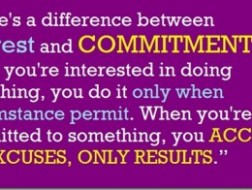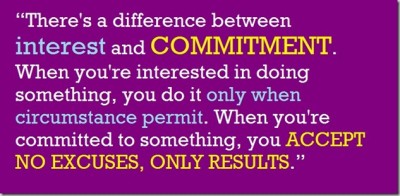Fundamentals # 3: Commitment

We do not rise to the level of our expectations. We fall to the level of our training. Archilochus, Greek Soldier, Poet, c. 650 BC.
We can have all sorts of expectations, wishes, desires and dreams for ourselves, but in order to fulfill those expectations, we need to commit to doing whatever it will require.
I’ve been pondering on the subject of commitment a lot lately, especially with the London 2012 Olympics happening at the moment. I’ve noticed on Facebook and other social networking sites, forums and threads, lots of people musing about how the athletes gets to these high levels; why they are so talented; how the hell they are in such good shape and have strong athletic bodies, etc. While a lot of different things certainly come into the equation to get them to where they are: genetics, upbringing, environment, etc. a lot of people fail to mention the simple, important aspect of commitment. These athletes would have had to commit their entire life to getting to the point that they are at. They would have had to make so many different sacrifices that no one will ever fully understand to get to their level.
And while not everyone is training to be an Olympic athlete, nor do we have the same goals or necessarily need to adhere to such high levels of commitment in our training, we can certainly learn a thing or two from the example of dedication these athletes set. Commitment is something that a lot of us could stand to have a bit more of in our lives, training and diet.
Context
The first issue I want to talk about is context. We all have big dreams for ourselves. But sometimes we have to ask ourselves if the goals we have fit in the proper context of our lives. These goals can be a problem when they are taken out of the context of our lives, or when the time and energy one is able to put into reaching the goal, is not on par with the goal itself.
Your goals need to fit within your personal reality and be realistic for you individually. For example, if you are happy just being a social butterfly at the gym, training a couple of times a week (not saying this is a bad thing), and you also have a pretty busy desk job, then getting to a 2 x bodyweight squat probably wouldn’t really fit in with the reality of your life. If you want to drop 3 dress sizes in six months for your wedding, but you don’t have time to learn the basic concept behind calories and macros and learn how to make proper food choices, then it probably won’t become a reality. If your life only allows you the time to run once a week, is it really realistic to expect to be the fastest runner in your next race?
Do you see where I am going with this?
The point here is that we all have wishes and dreams, but it is only a proper goal (and not just a dream) if it fits in the context of your life. And if you really really want something to happen, but you realise it isn’t fitting in with the reality of your life, then change an aspect of your life to make it fit.
Goal setting is the first step and extremely needed! But just remember when setting your goals that context matters!
Commitment:
Now that we’ve covered context, the next important issue to think about is commitment. This is committing to train, even when you are feeling lazy and tired. Committing to the day to day and the things you can control. Scheduling the time to train, showing up, and putting in the hard work. Because if you can’t commit to that, then all the perfect programming in the world, dietary and fitness knowledge, and learning the proper form and movements, won’t make one bit of difference.
You have to be willing to put in the time. You have to pick a plan and stick with it, because results won’t come overnight. Decide what it is that you really want to achieve with your training and do it. Don’t over analyze everything because I can promise you that you’ll never get anywhere if you do that. Don’t question it. Don’t overthink it. Just pick a solid, proven training plan that has a good track record of success and stick with it. Don’t ask everyone you meet what they think of your training program or what they are doing. Why? Because you will get an information overload from everyone, and their dog. Stop googling. Seriously, just stop it right now. Stick with what you’ve decided on and you’ll be blown away by the progress you can make when you properly commit to something.
There are plenty of people who continually make excuses for their lack of progress. The truth is, they are not fully committed. I know this and they know it too; they just don’t want to admit it. Do you have what it takes to fully commit to your goals? To stop questioning what you’re doing and wondering if there’s a faster, easier way? To realize that honest, hard work is the only way to achieve something great? It will take being completely upfront with yourself. Are you really giving it your all in every training session? When your sprinting session calls for your full effort, are you well and truly spent? When you lift weights, are they properly heavy for you or are you just running through the motions? Are you committed to fueling your body with the right kind of foods it needs in the right amounts?
If skipping a training session because you think you might be “overtraining” is your way of getting out of a workout; if stopping to have a chat in the middle of your session is your way of having extra rest and not going as hard as you should be, then you might want to address those lack of commitment issues, instead of looking for reasons why your program isn’t working for you.
(A quick note on “overtraining”: While I am very big on proper recovery [I am actually doing a post on rest and recovery] I did want to mention, that nine times out of ten for the average person, you are not "overtraining". I honestly believe this. You might not be doing the best and smartest training that you could be doing, but I daresay “overtraining” is thrown around a lot more than it’s actually warranted. Being sore does not mean you have been overtraining. Being tired and feeling sluggish does not mean you have been overtraining. There are definite symptoms of overtraining, and I will address these in my upcoming post, but unless you are doing hardcore training 5 or more times a week, you more than likely don’t have to worry about overtraining. Sometimes you just need to have a nice big cup of cement and harden up. :) )
You aren’t ever going to reach your goals if you keep making excuses, even “legitimate” excuses. I know it’s confronting to hear that maybe the problem is a lack of commitment. It is hard for me to hear it about myself or to realise that sometimes I am just not committed enough to doing what it takes to reach my goals. I know when I have more to give, when I have been slacking off, and I don't like to admit it. It’s the same with some of my clients. As much as I care about them and want them to succeed and reach their goals, I only care as much as they care. If they can’t fix the stuff that really doesn't take much more than plain ol’ honest commitment, well then I can’t really help them.
When you are committed you will do the work even when no one is watching, you won’t keep cancelling personal training sessions, you won’t cut your workouts short, you won't lie about what you're really eating, you will fill in your knowledge gaps, seek out training and follow through on your diet and training plans. If I find myself working harder at my client’s goals than they are, it’s time to ask them about their commitment levels.
Remember, no matter what your goals are, you will only earn as much as you work for. Are you being honest with yourself, and REALLY giving it your all in your training?
Join the other 10,000+ who get my best fitness, diet & mindset tips.



Comments